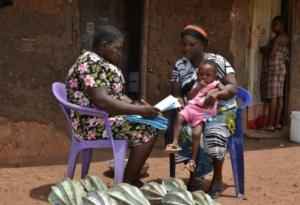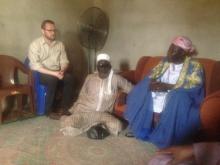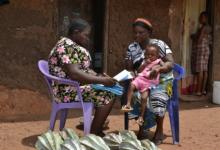WHO supports states to implement integrated community case management
Abuja, 01 June 2015-The World Health Organization (WHO), in collaboration with the Federal Ministry of Health (FMOH) and National Primary Healthcare Agency (NPHCDA), conducted a two week monitoring and programme support mission to Abia and Niger States on the Rapid Access Expansion (RAcE) 2015 project from the 12—22 May as part of routine activities to ensure quality of implementation.
The mission which set out to meet and review project progress with the key focal points at federal and state Ministries of Health, NPHCDA, the Canadian Government, partner organizations as well as Implementing NGOs, also collected key inputs into the review of the intervention in Niger and Abia states and provide key inputs on Integrated Community Case Management (ICCM) policy issues, and long term sustainability of the intervention for the programme.
RAcE 2015 is an ICCM project funded through the WHO Global Malaria Programme (GMP), with the support of the Canadian Department of Foreign Affairs, Trade and Development (DFATD) to support case management of diarrhea, pneumonia and malaria in children aged 2-59 months at the community level in Abia and Niger states in Nigeria.
According to Dr Andrew Mbewe (MO/CAN) of WHO Nigeria Country office, “the main objective of RAcE 2015 is to catalyze the scale-up of ICCM, which includes the treatment of common childhood illnesses, as an integral part of government-provided health services”.
He noted that the goal is to increase coverage of diagnosis, treatment, and referral services for malaria, pneumonia and diarrhea; the three major causes of childhood mortality and therefore, accelerate achievement of the health-related Millennium Development Goals.
The project commenced in 2014 in the two states whereby community resource persons (CORPS) are currently treating sick children in six and 15 local government areas of Niger and Abia states respectively. The project is currently been implemented by two grantees in Nigeria, the Society for Family Health in Abia and the Malaria Consortium in Niger.
During the visit to Abia, the team met with the Executive Secretary, Abia state Primary Healthcare Development Agency, Dr Chukwuemeka Oluoha who expressed appreciation to WHO and the FMOH for selecting the state as site for such a laudable project as it “targets children who through no fault of theirs, are constantly at risk of childhood diseases that impair their development and wellbeing”
His counterpart in Niger echoed similar gratitude and gave the assurance that “the state government will continue to play its part towards ensuring the sustainability of the project in the state”.
However, during the debriefing session with the WHO Representative in Nigeria, Dr Rui Gama Vaz, emphasized the need to develop mechanisms for documentation and dissemination of best practices emanating from the implementation of ICCM in the two states for wider information and implementation.
The WHO support mission team, led by Gunther Baugh the RAcE project Manager at WHO HQ, and accompanied by Dr Jackson Sillah (ICCM focal person at WHO/IST/WA for Nigeria r), Dr Andrew Mbewe, Dr Lynda Ozor (NPO/Malaria) and Dr Joy Ufere (NPO/ICCM); recommended that both Abia and Niger states take total ownership of ICCM for sustainability.
__________________________________________________
For more information, please contact:
Technical contacts:
Dr Andrew Mbewe; Tel: +234 803 535 4873; Email: mbewea [at] who.inttarget="_blank"
Media contact:
Ms Charity Warigon; Tel: +234 810 221 0093; Email: warigonc [at] who.int
__________________________________________________
Below:
01. A community resource person assessing a sick child in Abia
02. Global Project Manager, Gunther Baugh paying courtesy call on a traditional ruler in Niger






